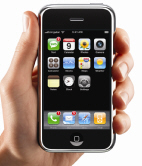iPhone neglects the prosumer

Here they are:
--Do I get an iPhone?
--Will I still need my Blackberry/Treo for business?
--How will it interact with my corporate network when synching contacts, Outlook etc.?
--How important is pushing corporate email to me?
--Will my CIO support it?
--How will OS X work with my corporate Windows environment?

What's the big deal? The iPhone has non-corporate-grade e-mail functionality and Enhanced Data rates for GSM Evolution (EDGE) rather than High-Speed Downlink Packet Access (HSDPA) wireless Internet. That's a fancy way to say the iPhone isn't 3G. The first volley of iPhone's push email is a deal with Yahoo mail. But pushing corporate email may be more important since smartphones straddle the corporate/consumer divide. As a result, the iPhone may put off potential corporate customers, opines Steve Lidberg in a Pacific Crest Securities research note.
Lidberg adds that he expects Apple to address these issues in future models, but enterprise users need to ponder it. There's also an interesting calculation made by Apple, which by removing the "Computer" from its name, has fully transitioned to a consumer electronics company. The calculation appears to be that prosumers don't matter--at least initially.
It's quite possible that iPhone's desktop browsing experience does away with some of these concerns. But it's a bit unclear at this juncture.
Meanwhile, most analysts expect iPhone to occupy a premium brand position and then move downstream. This strategy is consistent with what Apple did with iPods and its different flavors--Mini, Nano, and Shuffle.
However, that strategy may neglect the prosumer. Some smart Wall Street types are already spotting the prosumer-iPhone disconnect. Bear Stearns analyst Andy Neff--one of the best in the business--noted that "we would buy RIMM on weakness given iPhone's lack of corporate email, price premium vs. RIMM, and sole availability at Cingular and in U.S."
[poll id=38]